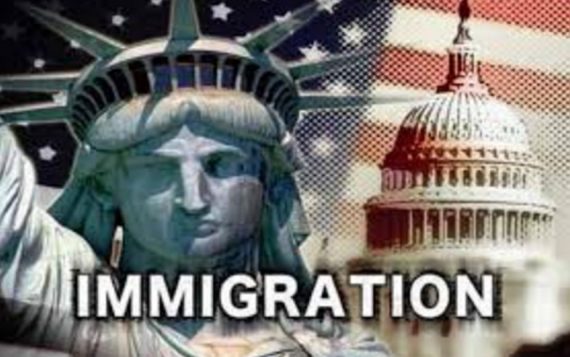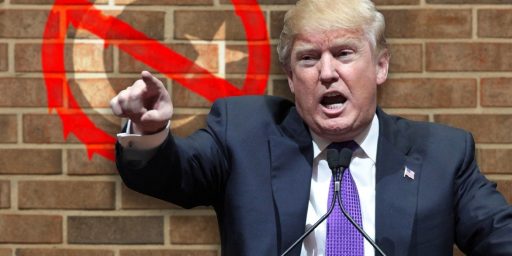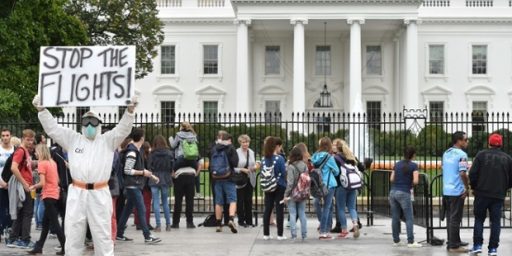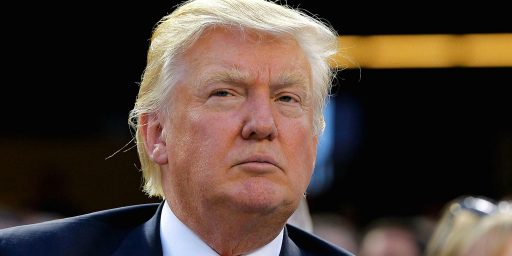Trump Administration Delays New Muslim Immigration Ban Order
The announcement of a new Muslim travel ban Executive Order has been delayed once again.
It’s been nearly a month now since President Trump’s Executive Order barring immigration or travel from seven majority Muslim countries was blocked by a Federal District Court Judge in Washington State, and later, by a panel of the Ninth Circuit Court of Appeals. In the immediate aftermath of the Court of Appeals ruling, the Administration announced that it was declining to immediately proceed with an appeal of the panel’s decision and would instead attempt to rewrite the order in a manner that would address the legal deficiencies that those two courts, along with several others across the country, have found with the original order only to delay the issuance of a new order several times now. This morning, Politico reports that the order has once again been delayed, which could be a suggestion of either internal disagreement within the Administration or a sign that they’re having a harder time than expected addressing the concerns that have made the original order legally questionable:
President Donald Trump won’t sign a revised travel ban on Wednesday as had been anticipated, two senior administration officials confirmed.
One of the officials indicated that the delay was due to the busy news cycle, and that when Trump does sign the revised order, he wanted it to get plenty of attention.
“We need [the executive order] to have its own time to breathe,” the official said.
The Trump team has repeatedly delayed issuing the new order after its original version was stayed by courts amid a slew of legal challenges.
After courts blocked his initial order, Trump argued its suspension would endanger national security. “Just cannot believe a judge would put our country in such peril. If something happens blame him and court system. People pouring in. Bad!” Trump tweeted on Feb. 5.
Administration officials did not say when Trump would sign the revised order. The new version is expected to drop Iraq from the original list of seven predominantly Muslim countries whose citizens will be temporarily barred from getting visas to the United States.
The Washington Post, meanwhile, summarizes some of the expected details of the new order:
The Trump administration is finalizing a revised travel ban that exempts current visa holders, according to people familiar with the matter.
The revision marks a significant departure from the now-
frozen first executive order, which temporarily barred citizens of seven majority-Muslim countries and all refugees from entering the United States and resulted in the State Department revoking tens of thousands of visas. Justice Department lawyers hope the new order will be more likely to withstand legal challenges and will not leave any travelers detained at U.S. airports.The new order also removes an exception to the refugee prohibition for religious minorities, one person said. Critics of the order had said that that exception proved the order was meant to discriminate on the basis of religion, because it allowed only Christians into the country.
The new order, the details of which were first reported by the Wall Street Journal, was expected to be signed Wednesday, but the White House canceled that after Trump’s speech Tuesday night.
The people who described it to The Washington Post did so on the condition of anonymity because the administration had not authorized the release of details. The people said that the situation is fluid and that changes are still possible.
There will be a period between when the order is signed and when it takes effect, in hopes of avoiding the problems that occurred when the last order was implemented. While blocking only the issuance of new visas marks a substantial change, analysts have said that this would not necessarily be enough for the order to pass legal muster.
Spokesmen for the White House, Justice Department and Department of Homeland Security declined to comment for this report.
It’s possible, of course, that the Administration chose to delay the roll out of the Executive Order so as not to step on news coverage of last night’s address to Congress, which is receiving generally positive reviews from most pundits and seems likely to turn around some of the negative coverage they’ve gotten over the past five weeks. Once this new order is released, it’s likely that the focus will shift away from the speech and back toward the specifics of how Trump is governing and the content of his policies, both of which leave a lot to be desired. OF course, if that’s the reasoning, as at least one report from CNN seems to indicate then that arguably undercuts the security arguments that the Administration is making in favor of the ban. After all, if there’s a significant national security threat that needs to be addressed then, as Think Progress asks, why delay its implementation for what are essentially public relations purposes? Additionally, the legal problems with the first order were so significant that it’s likely that the White House Counsel, Justice Department and other Federal agencies are going over this latest draft with a fine-toothed comb to try to ensure that it addresses the problems that the Courts have pointed out in the first order as best as possible. As the Post notes, that could turn out to be a tall order that the Administration is unable to overcome:
The White House counsel already had clarified that the ban did not apply to legal permanent residents, although courts have said they could not rely on that assertion because it was a separate statement and not part of the executive order. Officials hope the new executive order will allay that concern and also reduce the number of plaintiffs who have the right to sue.
Even that, though, might not go far enough. The 9th Circuit panel that ruled the ban should remain frozen said such a revision would not address claims “by citizens who have an interest in specific noncitizens’ ability to travel to the United States.” That, analysts have said, might be referring to the foreign wife of a U.S. citizen who is seeking a visa.
A spokesman for Washington state Attorney General Bob Ferguson, who had successfully sued to freeze the ban, said, “Our current stance is to wait and see the particulars, which could make all the difference.”
Lee Gelernt, the deputy director of the American Civil Liberties Union’s national Immigrants’ Rights Project, who is involved in a separate legal challenge, said, “If the new executive order contains a ban, we believe it is unconstitutional religious discrimination and will therefore continue our legal challenges.”
The administration must also contend with comments the president and top allies and his advisers have made, which could serve as evidence that the ban was intended to discriminate on religious grounds. On the campaign trail, Trump called for a “total and complete shutdown of Muslims entering the United States.” And after the election, former New York City mayor Rudolph W. Giuliani said: “So when [Trump] first announced it, he said, ‘Muslim ban.’ He called me up. He said, ‘Put a commission together. Show me the right way to do it legally.’ ”
The devil, of course, will be in the details and we’ll have to wait until the order is actually is and what those details are before we can have any real debate about its legality. As a preliminary matter, though, it seem clear that the Trump Administration will have a high barrier — dare I say, a wall? — to clear if this new order is going to pass muster with the courts. Not the least this is because of the record that has already been established regarding the true intentions behind the order actually are and it’s impossible for them to take back what the President, Rudy Giuliani, and others have said that make it clear that the primary intent of the order is to focus on immigrants of a Muslim background. Additionally, as the Ninth Circuit panel pointed out in both its order and in oral argument, there has been little evidence presented that the seven nations included in the ban have been a significant source of terrorist attacks inside the United States in the decade and a half since the September attacks. The evidence that is available shows that the vast majority of those attacks have either come from nations not included in the ban, such as Egypt, Saudi Arabia, Pakistan, and the United Arab Emirates, or they have come from American citizens or people who were brought to the United States as young children at a point in their lives when no reasonable person would have been able to make the case that they or their parents were potential security risks. In fact, as The New York Times reported in late February, the evidence shows that people from the seven nations included in the original travel ban do not pose a significant security risk:
When President Trump signed an executive order last month temporarily barring visitors from seven mostly Muslim countries, he said he was moving to protect the United States from terrorist attacks. The Homeland Security secretary, John F. Kelly, echoed the president, saying the travel ban was necessary because vetting procedures “in those seven countries are suspect.”
But an internal report written by intelligence analysts at Mr. Kelly’s department appears to undercut the assessment that people from the seven countries — Iran, Iraq, Libya, Somalia, Sudan, Syria and Yemen — pose a heightened threat of terrorism. The three-page report found that “country of citizenship is unlikely to be a reliable indicator of potential terrorist activity.”
The report adds to the difficulties the Trump administration has faced in carrying out the travel ban. Federal judges have suspended the order, and the administration has said it will redo it to withstand legal scrutiny, but has not given a timetable.
The Department of Homeland Security assessment, first reported by The Associated Press, found that only a small number of people from the seven countries had been involved in terrorism-related activities in the United States since the Syrian civil war began in 2011. In addition, the report noted, while terrorist groups in Iraq, Syria and Yemen pose a threat to the United States, militant groups in the other four countries have a more regional focus.
The report also found that in the past six years, the terrorism threat reached much more widely than the seven countries listed — individuals from 26 countries had been “inspired” to carry out attacks in the United States.
Furthermore, few individuals from the seven countries affected by the ban have access to the United States, the report said, noting the small numbers of visas granted by the State Department to citizens of those nations.
With facts like these, it’s hard to see how the Administration will be able to justify the kind of ban included in the original order if that is what carries through to whatever is released.





Delayed so that Trump can bask in the attention of pretending to be presidential and the expected bounce in approval.
Once the gloss of his phony words is tarnished by his actions it’ll be back to the normal death spiral approval ratings.
The Apple Dumpling Gang or 20-dimensional chess… You decide.
It would be nice if they communicated the directives all the way down to staff working in the field before tossing them out there.
If it’s going to look like a morass, it will go out late on a Friday afternoon.
Facts mean nothing…it’s how the redneck base FEELS that is important. They want to FEEL like there is an authoritarian daddy taking care of them and protecting them from the brown-skinned boogie-men.
If only I could find a nice 30 year old woman with daddy issues…instead of the old white guys in the republican party. Jake, Ryan, JKB, bill…I’m sure they all FEEL coddled and comforted by their baby-king today.
Trump Administration Delays New Muslim Immigration Ban Order
Not sure what President Obama would think about delaying President Pud’s inauguration but it would have been acceptable to me.
Pass that joint will ya’.
OT, but Ryan Zinke has been confirmed as interior secretary.
From the excerpt quoted from Politico: “We need (the EO) to have it’s own time to breathe.”
Like fine wine?
By his own account, any delay means terrorists will be streaming across our borders unchecked. If deliberation is needed, perhaps we should let Congress craft the policy.
@James Pearce:
Come on, man, surely you don’t expect Trump to remember what he says from one day to the next, do you?
Every day is a brand-new beginning in Trump World.
View from abroad: POTUS appears to have delayed the announcement in order to bask in the glory of proving that he is potentially capable of chewing gum whilst walking. The bar is indeed set low for President Trump!
On one hand, Trump needs to throw another Muslim-bashing bone to his fan club.
On the other, a second failure in the courts could cause some blowback among some of those supporters who may begin to question his competence.
So Trump is in a bit of a bind, and I can understand the hesitancy at his end. He may try to put this one out in the Friday trash, then talk it up during the following week if it doesn’t collapse under its own weight.
I’m with the others, if we take the Trump Administration at their word, they are delaying something that is critical for national security so that Trump can feel good about his speech.
I am however, intrigued by the potential possibility of everyone cheering Trump religiously every day, in exchange for him agreeing to do absolutely nothing the rest of the time he is in office. We could do worse…
@Daryl’s other brother Darryl: Conveniently, based on the number of Muslims they interact with on a daily basis, the average American will be exactly as safe with the ban as they were without the ban. So there is a very low probability that there will ever be any evidence to contradict those feelings.
If the courts should be at fault is a terrorist slips through because of their stay orders, how should we interpret this Administration’s delay in drafting another EO?
@Gromitt Gunn:
The average American…who already faces an infinitesimal risk of terror…yes.
The nation as a whole is already at a far greater risk of terror than before Jan 20, 2017.
Trump is clearly gun-shy. I wonder if this kind of risk-averse behavior will actually become more of the rule rather than the exception, given this was his first action as President.
The first EO was pretty much the work of Bannon-Miller when there were few, if any Trump appointees running the relevant security agencies. Many of those people are in place and there very well be a heated discussion going on as to if a travel ban is needed or desirable.
Don’t ever imagine the protests against Trump’s policies are useless. This delay and change is a direct result of the howls that erupted after his first attempt.
@Sleeping Dog: Well, a travel-ban-redux controversy might be just what they think they need to distract from the apparent perjury of the Attorney Gen’l. Which is one of the charges that sent John Mitchell to prison for 19 months. It’s taken more seriously than, say, the Logan Act.
Of course, there was no oral sex involved. One hopes. With the Russian ambassador.
Except metaphorically.
@Hal_10000:
Nah, it’s the direct result of WA and MN state attorneys filing cases in federal court. The protesters had no influence on how the case was decided, nor should they.
Trump’s rewriting the Muslim ban to survive another court challenge. The concerns of the protesters will remain unaddressed.